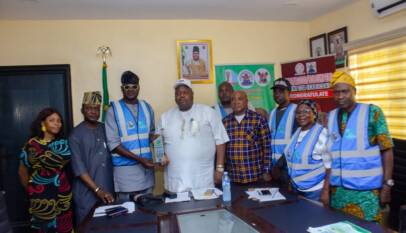Suffering, still living it: APC apologists example

By Comrade Godwin Anyebe
In the face of mounting economic challenges, widespread insecurity, and deepening societal divides, one would expected the ruling political party in Nigeria, the All Progressives Congress (APC), to face overwhelming backlash.
Yet, despite the growing discontent among citizens and the stark reality of Nigeria’s struggles, a significant group of APC apologists remains steadfast in their support for the party.
These individuals continue to defend the government’s policies, often with unwavering loyalty, even as the country grapples with persistent hardship. This phenomenon raises an important question: Why do some Nigerians continue to support the APC, despite the suffering and challenges that have defined the party’s tenure?
The burden of economic hardship
Nigeria’s economy has been on a downward spiral, marked by rising inflation, a surge in the cost of living, and increased unemployment. The removal of fuel subsidies, though necessary in the long term, has compounded the suffering of many, leaving citizens struggling to afford basic necessities. Despite these hardships, many APC supporters—often dubbed “APC apologists”—defend the government’s decisions, viewing them as tough but necessary steps toward long-term growth.
For these apologists, there is often an argument of patience: “Things will get worse before they get better.” This rhetoric is continuously pushed, despite the fact that for many Nigerians, the ‘better’ seems further out of reach. The mantra of “enduring suffering for a brighter tomorrow” is frequently echoed, but for a populace already grappling with years of hardship, it feels more like an unfulfilled promise.
Political tribalism and loyalty
One major factor behind the unwavering support of APC apologists is political tribalism. In Nigeria, political allegiance often transcends policy or performance; it is deeply rooted in regional, ethnic, and religious affiliations. For many APC supporters, particularly in the western region, supporting the party is not just a political stance but a form of loyalty to their cultural. Criticizing the party might be seen as a betrayal of their collective identity, regardless of the government’s failures.
Moreover, this kind of loyalty is perpetuated by party propaganda, which paints the opposition as corrupt or incompetent, further entrenching the belief that the APC, despite its shortcomings, remains the lesser of two evils. The apologists cling to the idea that the party’s intentions are good, even if the execution is flawed.
The role of propaganda and misinformation
The power of propaganda in shaping public opinion cannot be underestimated. The APC government has adeptly utilized state-controlled media and other platforms to spread its narrative, often focusing on selective achievements while downplaying or outright denying the more dire aspects of governance. By framing challenges as a result of external factors—such as global economic conditions or the mismanagement of previous administrations—the APC shifts blame away from itself.
Many APC apologists have fully absorbed this narrative, repeating it in defense of the party. They attribute Nigeria’s problems to past leadership or external forces, arguing that the government is doing its best under difficult circumstances. The role of misinformation, whether through media manipulation or social media echo chambers, further reinforces their belief in the party’s cause.
Personal and Financial Interests
For some apologists, their support for the APC goes beyond ideology or belief in the party’s vision. Personal or financial interests often play a significant role. Individuals who are beneficiaries of government contracts, appointments, or other political favors are unlikely to criticize the administration, as doing so could jeopardize their positions or future opportunities. These individuals become defenders of the status quo, not out of conviction, but out of necessity.
This kind of self-interest-driven loyalty creates a divide between the everyday citizen who feels the full brunt of economic hardship and the political elite who benefit from the system. The apologists, in many cases, are insulated from the struggles of ordinary Nigerians, making it easier for them to defend policies that have caused widespread suffering.
A Disconnect from Reality
Perhaps one of the most perplexing aspects of APC apologists is the sheer disconnect from the lived reality of many Nigerians. While it’s true that every government faces challenges, the current administration’s shortcomings—ranging from economic mismanagement to failures in addressing insecurity—are stark. Yet, apologists often remain tone-deaf to these realities, viewing criticism as unpatriotic or ungrateful.
This disconnect is often a result of echo chambers, where apologists only consume media that reinforces their beliefs. In these spaces, dissenting opinions are dismissed, and the government’s shortcomings are glossed over. By insulating themselves from opposing viewpoints, these individuals remain entrenched in their support for the APC, even as the nation suffers.
The existence of APC apologists in the face of widespread suffering in Nigeria speaks to a complex mix of political loyalty, propaganda, personal interest, and societal divisions. While they may genuinely believe in the party’s cause, their continued support often overlooks the harsh reality of life for millions of Nigerians. As the country navigates its numerous challenges, one can only hope that these individuals will eventually recognize the need for accountability and governance that prioritizes the welfare of the people over party loyalty.
In a democracy, constructive criticism and holding leaders accountable are essential for progress. Until the apologists confront this reality, Nigeria may continue to struggle under the weight of a political class that prioritizes survival over meaningful change.
Comrade Godwin Anyebe is a Journalist and a Human Rights Activist
Egbe -Idimu Chairman rallies support for President Tinubu’s economic reforms, to commission additional free buses
Stanley Ihedigbo Executive Chairman of Egbe Idimu Local Council Development Area (LCDA), H…









